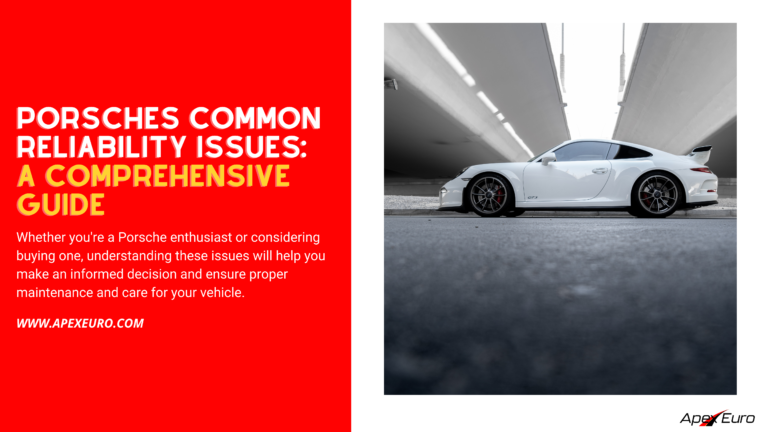When it comes to luxury sports cars, Porsche is a brand that stands out for its performance, craftsmanship, and timeless appeal. Porsche cars are known for their sleek design, powerful engines, and exhilarating driving experience. However, like any other automobile, Porsches are not immune to reliability issues. In this article, we will explore some common reliability issues that Porsche owners may encounter. Whether you’re a Porsche enthusiast or considering buying one, understanding these issues will help you make an informed decision and ensure proper maintenance and care for your vehicle.

Porsches are generally well-built and reliable vehicles, but there are a few common issues that have been reported by owners over the years. Let’s take a closer look at these issues and understand how they can affect your Porsche ownership experience.
One of the most well-known reliability issues with certain Porsche models is IMS (Intermediate Shaft) bearing failure. The IMS bearing is a small component that supports the intermediate shaft in the engine. In some cases, the original IMS bearing design can fail prematurely, leading to catastrophic engine damage. This issue mainly affects Porsche 911 models produced between 1997 and 2008. If you own or are considering buying a Porsche 911 from this era, it’s important to have the IMS bearing inspected and, if necessary, upgraded or replaced to prevent potential engine failure.
Another common issue reported by Porsche owners is air/oil separator failure. The air/oil separator is responsible for separating oil vapors from the air in the engine’s ventilation system. Over time, the separator can become clogged or fail, causing oil leaks and excessive oil consumption. This issue is more prevalent in older Porsche models, particularly the Boxster and Cayenne. Regular inspection and maintenance of the air/oil separator can help prevent costly repairs down the line.
Some Porsche models, such as the Cayenne and Panamera, have been known to experience coolant pipe leaks. The plastic coolant pipes used in these models can degrade over time and develop cracks or leaks, leading to coolant loss and potential engine overheating. Regular inspection of the coolant pipes and proactive replacement can mitigate the risk of leaks and ensure proper engine cooling.
Porsche vehicles equipped with air conditioning systems may encounter A/C compressor failure. The A/C compressor is responsible for circulating and compressing the refrigerant in the air conditioning system. Over time, the compressor can wear out or develop leaks, resulting in reduced cooling performance or no cooling at all. This issue can be more prevalent in warmer climates or if the A/C system is not regularly used. Regular maintenance of the A/C system and prompt repair of any compressor issues can help keep your Porsche’s cabin cool and comfortable.
Some Porsche models, particularly those equipped with manual transmissions, may experience clutch and transmission issues. Premature clutch wear, slipping, or difficulty engaging gears can be signs of a failing clutch. Transmission issues, such as gear grinding or rough shifting, may also occur. Regular maintenance, including proper clutch adjustment and fluid changes, can help prolong the life of the clutch and ensure smooth gear changes.
Yes, Porsches are generally reliable cars. However, like any other vehicle, they can experience certain reliability issues. Proper maintenance, regular inspections, and addressing known issues can help ensure a trouble-free ownership experience.
While Porsches, in general, have a good reputation for reliability, some models have been associated with specific issues. The Porsche 911 models produced between 1997 and 2008 are known for IMS bearing failures, and older Boxster and Cayenne models may experience air/oil separator issues.
Driving a Porsche with a failing clutch is not recommended as it can lead to further damage to the transmission and other related components. It’s best to have the clutch inspected and repaired as soon as possible to avoid costly repairs and ensure safe operation of the vehicle.
Porsches are renowned for their performance and luxury, but like any other vehicle, they can experience reliability issues. Being aware of common problems such as IMS bearing failure, air/oil separator issues, coolant pipe leaks, A/C compressor failure, suspension component wear, and transmission and clutch issues will help you take proactive measures to prevent or address these problems. Regular maintenance, inspections, and prompt repairs are crucial in ensuring a trouble-free ownership experience with your Porsche. By staying informed and taking care of your vehicle, you can enjoy the exhilaration of Porsche ownership for years to come.